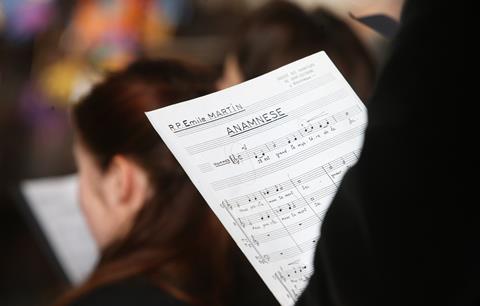Most people believe choral music helps them better engage in worship. Yet most charismatic evangelical churches haven’t had a choir in years. Calum Carswell explains why he thinks choirs should make a comeback, and why that doesn’t mean you need to throw away your church’s drum kit

Covid has sucked. It just has. But I wonder if the endless lockdowns and missed services have given the church a once-in-a-generation opportunity to do things that we once saw as impossible.
There has been a monumental shift in how the Church worships, and as we return to normality (fingers crossed), it is time to take stock of our worship and carefully consider if we can build back better.
I’ve worked in enough charismatic evangelical churches to know that the very thought of choral music as part of contemporary worship seems impossible. So, why then did I undertake a PhD that sought to do that very thing? Good question. Well, I had a sneaky suspicion that we worship leaders had been missing something that could truly benefit the church, and this curiosity eventually drove me to undertake a research experiment.
Experimental worship
My research was simple: there were two services where I collected congregant’s feedback on how the music affected their worship: a standard band-led worship service, and a service whose music was led by a band and a choir. As I suspected, the congregation from the band-and-choir service overwhelmingly described the choral music as benefitting their worship. But what I found even more interesting was that the congregation described the beauty of the choral music as leading them to engage with the worship of heaven. This was particularly fascinating because it was described as being unique to the choral music.
But it kind of makes sense when you think about it. Artistic beauty is transcendent by nature because it comes from God. It makes sense that beauty should therefore lead to God. It can also be argued that – since we’re made in God’s image – our artistic creativity is a reflection of the ultimate creator. Either way, the experience of the band-and-choir congregation has a crucial implication for the charismatic evangelical Church. If the purpose of our musical worship is to lead a congregation to touch heaven, then our worship leaders need to understand that choral music may have a unique ability to do just that.
A return to the old ways?
So, does this mean that it’s time to return to organs, hymns, and choral evensongs? I think not.
Don’t get me wrong, I used to be the composer-in-residence at a high Anglican church, and there are certain church styles where this type of music is very effective. However, in the charismatic evangelical Church, this choral music is part of the ‘old tradition’ that was firmly (and rightly) rejected a long time ago. In my research, there was a participant from the band-led service who – despite not being asked about choral music – proceeded to write an unprompted two-page rant on how choirs would destroy the Church if they replaced bands. Now, all the responses in the research were anonymous, but if that person is reading this, then let me tell you that you are not wrong. I adore choral music, but before worship bands, many parish choirs had become musically stagnant.
it is possible to make this blend of worship music and choral music wholly seamless
So, to set the record straight, let me categorically say that contemporary worship bands are pivotal to our worship, and it would be foolish to even consider doing away with them. No, this is more complex than simply bands vs choirs - and it’s for composers like me to demonstrate what this can look like.
It’s unlikely that we can practically have choirs at every service, but when they are used, it can be in a number of ways. By composing flexible choral music, I was able to empower the choir to lead the ministry time along with the service leader and respond dynamically to the work of the Spirit. During extended times of worship, choirs can enhance the band’s music or even sing a worship piece on their own to allow the congregation to worship through listening. So long as the band leader, the service leader, and the conductor work closely together, it is possible to make this blend of worship music and choral music wholly seamless.
A call to arms
The biggest stumbling block to this style of worship is the lack of choirs. Because of this, I (unsurprisingly) propose that we create some. But instead of creating choirs of the ‘old tradition’, let’s take inspiration from the pre-Covid surge in community choirs.
Singing is innate to people, and in the charismatic evangelical churches that I’ve been part of, I’ve found a surprisingly large appetite for singing in choirs. It seems to me that choirs can strengthen our fellowship, open the doors to outreach and contribute greatly to our worship.
I want to leave you with a call to arms. If you are reading this as a composer, then compose – you’ll be amazed what can happen. And if you’re a pastor, a worship leader, or even just a worshipper, then please, consider a choir.

































